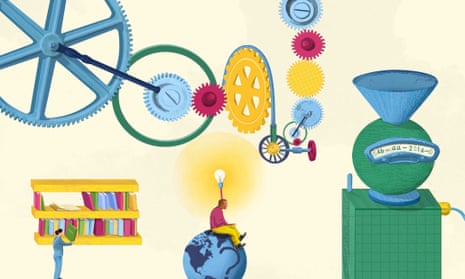One entertaining way to wind up a neuroscientist is to pretend to believe the popular notion that we use only 10% of our brains.
This myth is the premise of Luc Besson’s new film, Lucy, starring Scarlett Johansson as a woman who overdoses on a designer drug that supercharges her intelligence. The 10% figure, as Besson happily acknowledges, is utter cobblers. It persists, not because it’s true, but because it captures a nagging feeling that we could be doing vastly more with our minds, if only we knew how.
The ideas in this edition of Do Something won’t change the percentage of your brain that you use, but they might improve your cognitive skills, while delivering the pleasing sensation of getting brainier. The key isn’t how much of your mental capacity you’re using: it’s what you’re using it for.
To get smarter, of course, you need to decide what you mean by “smarter”. There’s little doubt that giving your mind a workout – on cryptic crosswords or sudoku, say, or memorising the capitals of US states – will make you better at that specific task. There’s also plenty of research demonstrating the benefits of treating your brain like the physical organ it is – which means plenty of aerobic exercise, a healthy diet, sufficient sleep, maybe some meditation. In studies on mice, it wasn’t mentally stimulating activities that spurred the biggest cognitive improvements: it was running on treadmills.
Tweaking your surroundings, even your clothing, might help: in one intriguing study, wearing a lab coat, stereotypically associated with braininess, appeared to boost performance on certain tests. And if all you care about is appearing smarter to others, social psychology has all sorts of suggestions: speak confidently and expressively; smile rather than frown; wear glasses; and use a middle initial. (In a recent experiment, “David F Clark” was rated as a better intellect than “David Clark”; “David F P R Clark” did even better.)
When researchers talk about improving brainpower, what they care about most is “fluid intelligence” – the general ability to manipulate information, solve problems and generate ideas. Unlike sudoku skills, fluid intelligence is transferable: if you could enhance it, you’d expect to reap benefits in multiple areas of life.
So can you? Few topics in psychology are more controversial, but the most promising evidence comes from a remarkably unpleasant brain-training game called the “dual n-back”, which involves a visual and aural memory test – you can try it at soakyourhead.com. The key finding is that getting smarter entails doing things that feel uncomfortably hard. Once you’re a crossword champion, by all means carry on doing crosswords for fun. But if you want to get smarter, do something you’re not good at.
This insight – that becoming brainier needs to feel a little tough – helps answer another fraught question: is technology making us smarter, or more stupid? It depends. Use it to eliminate cognitive tasks, and there could be a negative effect – that’s why it’s worth challenging yourself to navigate without GPS. Use it to expose yourself to demanding new material, on the other hand, and it’ll help. In his book Curious, Ian Leslie argues that we need to cultivate “epistemic curiosity” – not a scattered quest for novelty, but a focused, disciplined commitment to mastering new terrain.
Instead of leaping from one topic to another online, pick one subject and plunge deeply; put down your tablet and seek out books, or others who share your interest; try to retain facts instead of relying on web searches. As Einstein put it, “one should not pursue goals that are easily achieved. One must develop an instinct for what one can just barely achieve through one’s greatest efforts”. And rumour has it he was pretty clever.
Suggested reading
Explorations of the limits of our brains, plus ways of thinking differently
Smarter: The New Science of Building Brain Power by Dan Hurley (Penguin) A journey to the frontiers of “neural enhancement”, exploring everything from brain games and dietary supplements to “transcranial direct current stimulation”, which involves administering electrical jolts direct to the brain and shouldn’t be attempted at home. A less alarming but surprising path to increased intelligence, Hurley suggests, might be learning to play a musical instrument.
Mindset: How You Can Fulfil Your Potential by Carol Dweck (Robinson) Dweck, a Stanford University psychologist, explores a basic distinction in how people think about learning: the “fixed” v “growth” mindsets, and offers advice on cultivating the latter. If we think of intelligence as an unchanging quantity, she argues, we avoid the very challenges that could improve it, because we fear falling short.
Smarter Than You Think: How Technology is Changing Our Minds for the Better by Clive Thompson (William Collins) An optimistic but rigorous look at the effect of digital tools. Thompson probes the idea that computers and social networks form part of an “extended mind”: used wisely, he argues, Twitter and Facebook could be a key to getting smarter, not a fast track to distraction and shorter attention spans.








Comments (…)
Sign in or create your Guardian account to join the discussion